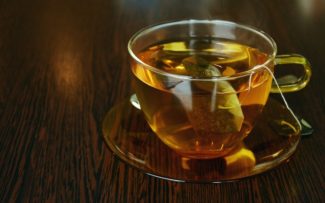How Much Caffeine is in Tea?

One of the biggest myths about tea is that it contains more caffeine than coffee. If you don’t want the caffeine, this may make you happy. If you are looking for that mid-afternoon caffeine fix, you may want to try one of our Green tea varieties. Whichever side you’re on, it’s important to know how much caffeine you’re really getting.
Brewed Tea Has Less Caffeine than Coffee
When you measure tea and coffee in their dry forms, it’s true that tea has more caffeine. However, this isn’t the case when the two are brewed.
The average person uses around 2 grams of tea for an 8-ounce cup, whereas the same size cup of coffee uses 10 grams. According to one 2004 British study, researchers found that the average caffeine level in a cup of tea is 40 mg, compared to 105 mg for coffee.
Now that we have that out of the way, let’s discuss which teas have the most caffeine content.
What Factors Impact Caffeine Content in Tea?
The amount of caffeine in tea depends on a variety of factors:
- Type of tea plant
- Fertilization method
- Clonal or seed propagation
- Harvest season
- Whether tea is from buds, leaves or a combination
- Processing method
The most significant factors are water temperature and steeping time.
Black, oolong, green and white loose leaf tea leaves all have around the same caffeine content, but there is going to be a lot more caffeine transferred when the leaves are steeped in boiling water for five minutes versus hot water for two minutes. Also, it’s worth noting that oxidation does not increase caffeine content in tea.
Which Teas Have the Most/Least Caffeine?
Typically speaking, these are the teas that have relatively high amounts of caffeine:
- Silver Needles (White)
- Darjeeling (Black)
- Ceylon (Black)
- Assam (Black)
- Gyokuro (Green)
- Matcha (Green)
Below are the teas that have very low amounts of caffeine.
Can I Make My Own Decaf Tea?
Another common myth is that you can make your own decaf tea by steeping the tea for a short time and then throwing away the leftover liquid. The theory is that most of the caffeine is washed away, but the reality is that caffeine is extracted over time. Therefore, around 20 to 30% of caffeine can be extracted in the first 30 seconds of steeping. Plus, if you “wash” away the caffeine, you’re also removing essential antioxidants.
If you want caffeine free tea, you’ll need to switch to herbal tea blends instead, such as chamomile or peppermint. These varieties are naturally caffeine free.

